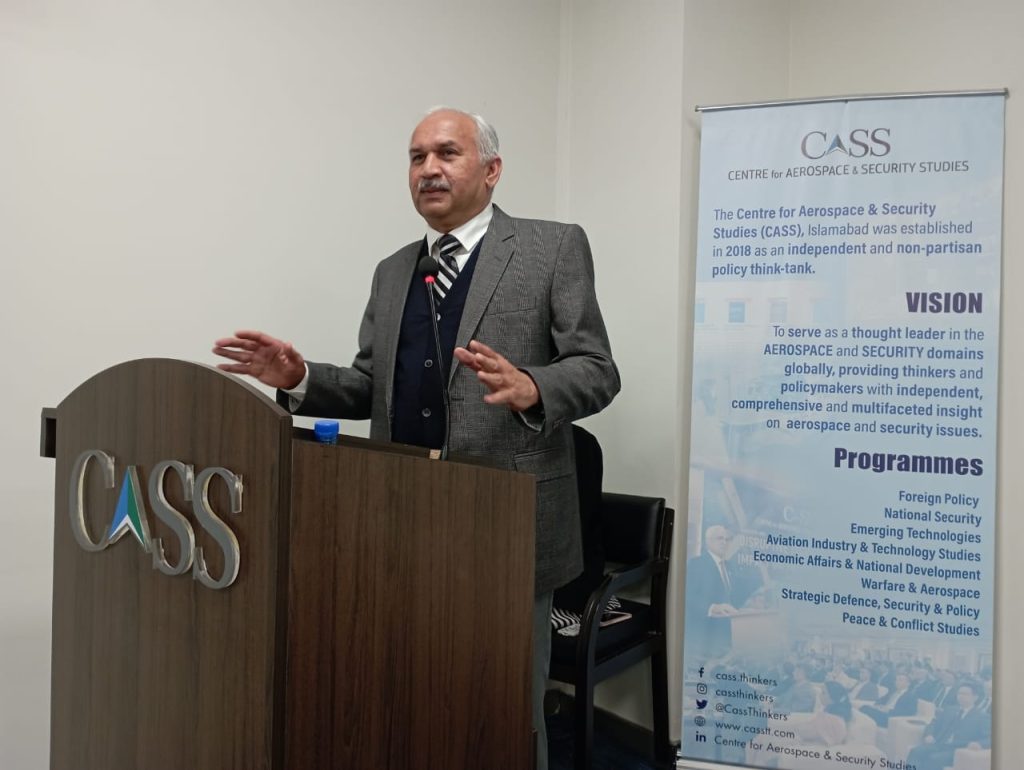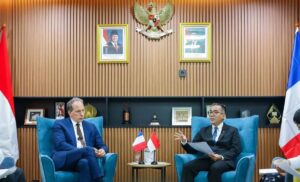Challenges to Pakistan’s Economy and the Way Forward

Islamabad, The Gulf Observer: ‘The current challenges offer a chance to seriously re-examine Pakistan’s economy.’ This was the key message of the eminent speakers at the seminar on ‘Challenges for Pakistan’s Economy and the Way Forward’ organised by the Centre for Aerospace & Security Studies (CASS) in Islamabad.
Pakistan has to seriously re-examine its economy: Speakers
Speakers included Syed Mohammad Shabbar Zaidi, Former Chairman, Federal Board of Revenue; Dr Nadeem ul Haque, Vice Chancellor, Pakistan Institute of Development Economics; Mr Haroon Sharif, Former Minister of State and Chairman Board of Investment; Dr Usman W. Chohan, Director, Economic Affairs and National Development, CASS, Islamabad. The seminar was concluded by President CASS Air Marshal Farhat Hussain Khan (Retd), while Ms Zahra Niazi, Research Assistant at CASS moderated the proceedings. Air Chief Marshal Mujahid Anwar Khan (Retd) attended the seminar as Guest of Honour.
Ms Zahra Niazi initiated the seminar by stating that that Pakistan was facing an unprecedented economic crisis, with fast-depleting reserves, declining exports and remittances, surging inflation, rising unemployment, weakening rupee, and decreasing business production threatening the country’s financial stability and the well-being of its people. This crisis, she stressed, was a result of various challenges originating from both domestic and external fronts.
Biggest issue is high import bill and weak export base, labour is not only expensive but inefficient. Absence of women in the labour force is also a major challenge
Discussing the structural roots of the economic crisis in Pakistan, and why the country had not been able to address them, Syed Mohammad Shabbar Zaidi pointed out that the biggest issue was high import bill and weak export base. He argued that labour was not only expensive and inefficient, absence of women in the labour force was also a major challenge. Given that the current rate of inflation was touching 25%, Mr Zaidi warned that inflation could become uncontrollable if emergency measures, such curtailing import bill, reducing energy bill by closing all businesses and shops by 6:30pm, and cutting the administrative costs of the government etc., were not undertaken.
Dr Nadeem ul Haque lamented that while the International Monetary Fund (IMF) was supposed to be a ‘ladder of the last resort’, for Pakistan, it had become its ‘go-to first option’ due which it had availed 23 IMF programmes in the last 75 years. He urged that the government’s strong footprint on the economy needed to be minimised since this had led to its overpoliticisation, and there was need to agree on a sacrosanct 10-15 year national ‘Charter of Economy’ to ensure policy consistency.
Inflation could become uncontrollable if emergency measures, such curtailing import bill, reducing energy bill by closing all businesses and shops by 6:30pm, and cutting the administrative costs of the government
While sharing IMF’s latest global economic outlook, Mr Haroon Sharif informed that while Pakistan was not the only country feeling the pain of rising inflation and economic slowdown, the question was how other countries were handling their economic crises. Mr Sharif informed that states like Dubai and Qatar had international financial centres where local laws were not implemented rather, they had separate set of laws. ‘Countries create corporate spaces with no government involvement which gives confidence to the private sector. We need to reduce the size of government, build trust with businesses and signal that we are serious about economic revival and moving on a path of progressive growth,’ he stressed.
Highlighting the polycrises engulfing emerging economies, Dr Usman W. Chohan was of the view that even countries that did well during the Pandemic were struggling in the post-COVID era, and that there were generalizable global worries to which Pakistan was no exception. He provided both short-term recommendations, in light of IMF stipulations, and argued for significant structural long-term reforms to make the economy truly sustainable.
While delivering the Concluding Remarks, Air Marshal Farhat Hussain Khan (Retd) thanked the speakers for their in-depth analysis of the economic challenges facing Pakistan and their policy proposals towards a way forward.
Without a consistent industrial policy, economic stability could not be achieved
He highlighted that Pakistan not only lost its industrial base in the 70s following the government’s nationalisation policy which led to de-industrialisation in the country, it also harmed human resource development; and eventually led to high dependence on imports. President CASS emphasised that without a consistent industrial policy, economic stability could not be achieved. ‘There is an urgent need for broad-based national consensus on a long-term and viable economic recovery plan,’ he concluded.
In his brief remarks, Guest of Honour, Air Chief Marshal Mujahid Anwar Khan (Retd) shared that CASS was conceived to not only bring awareness about aerospace issues, but to also develop Pakistan’s research capacity in this domain. He agreed that more research on pragmatic solutions was needed in every sector but underscored that any solution for the country’s progress would need to start by looking within to bring about positive change.
The seminar was attended by serving and retired PAF officers, scholars from various think tanks, journalists, and students, who actively participated in the interactive question and answer session.




